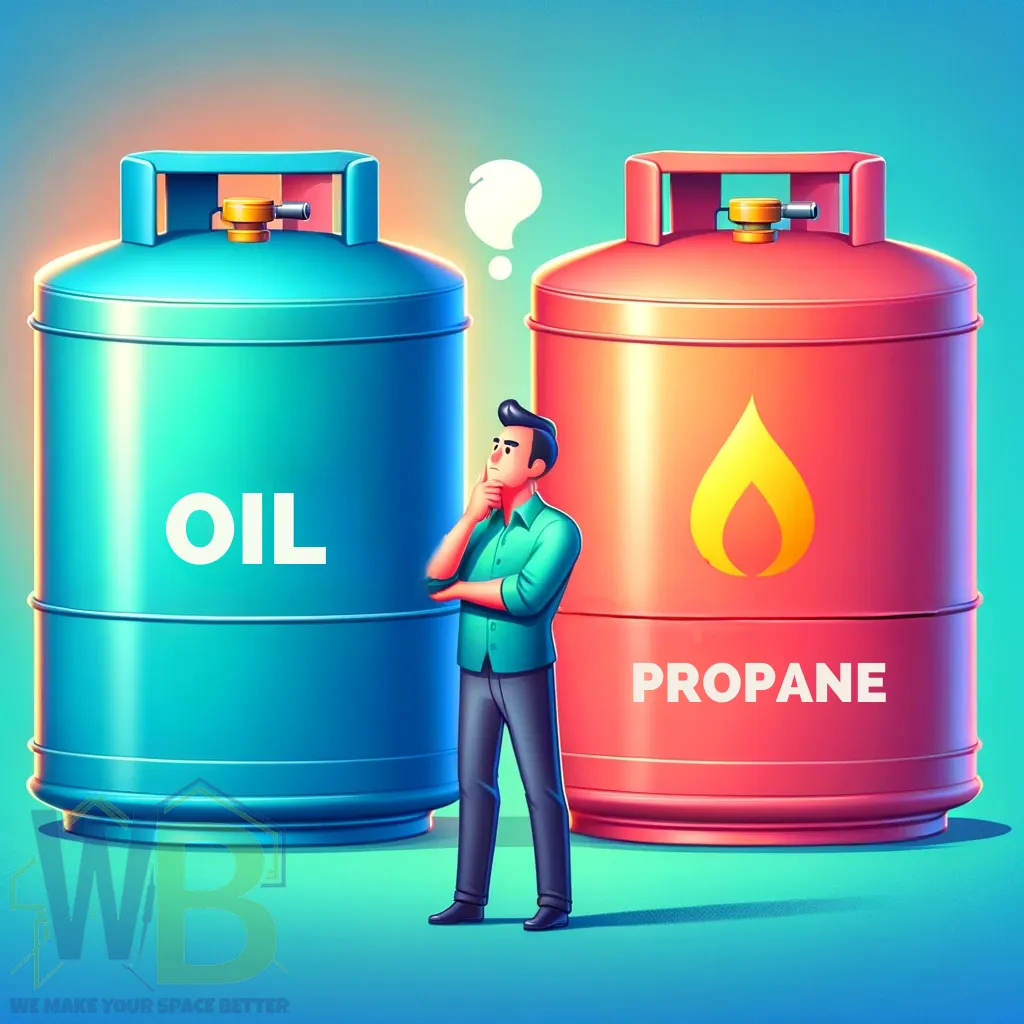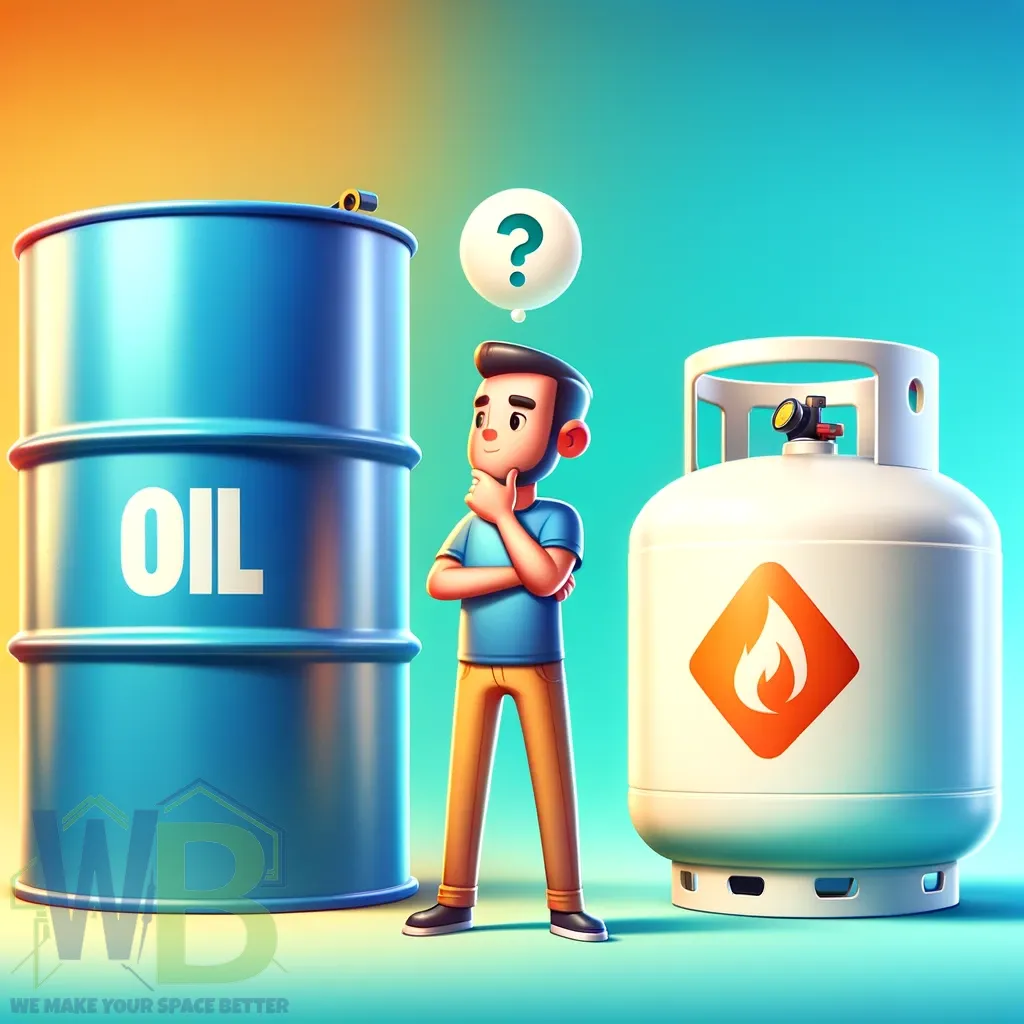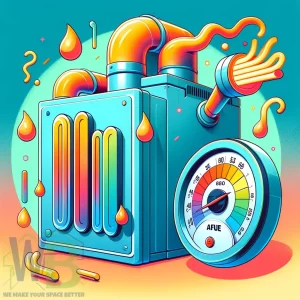Is it Worth Switching from Oil to Propane? Yes, It is worth it, and we will explain why. Both fuels have their fans, but it’s not just about personal preference.
We must consider costs and how they affect our planet and safety. Let’s dive in and see if switching to propane is a smart move for you.

Quick Summary
| Section | Key Points |
|---|---|
| Introduction | – Debate between oil and propane for home heating. – Importance of making an informed decision. |
| Cost Benefits of Switching from Oil to Propane | – Propane offers up to 18% savings in energy costs. – Propane furnaces are cheaper to install. – Propane is more efficient, leading to lower usage and cost. |
| Environmental and Safety Advantages | – Propane burns cleaner and is more environmentally friendly. – Safer, non-toxic, and poses less risk in case of leaks. – Propane does not contaminate soil or water like oil. |
| Propane’s Versatility and Convenience | – Propane powers various home appliances beyond heating. – Requires less maintenance and has longer equipment lifespan. – Fewer regulations and possible lower insurance premiums. |
| Efficiency and BTUs: A Technical Comparison | – Propane furnaces are up to 95% efficient. – Although propane produces fewer BTUs, its higher efficiency compensates. – Propane provides more effective heat per unit used. |
| Considerations Before Switching | – Importance of tank ownership for supplier flexibility. – Weighing upfront costs against long-term benefits. – Consider local propane availability and delivery. |
| Conclusion | – Summarization of propane’s benefits: cost-effectiveness, environmental friendliness, safety, and efficiency. – Emphasis on making a choice that aligns with personal needs and values. |
Oil to Propane: Why This Matters
Heating your home is a must, especially in colder areas. For years, many have used oil. But now, propane is getting attention as a possible better choice. It’s not just about staying warm; it’s about doing it wisely and affordably.
The Big Question: Oil or Propane?
So, why are people talking about switching? Costs are a big reason. Propane might save you money. But there’s more to it, like how it impacts the environment and safety. We’ll explore all these points.
Making an Informed Decision
Choosing a heating fuel affects your wallet, comfort, and health. That’s why it’s crucial to understand the pros and cons of oil and propane. You want a choice you’ll be happy with for years.
Cost Benefits of Switching from Oil to Propane

When heating your home, saving money is often a top priority. That’s where propane steps in as a strong contender.
But is it cheaper than oil? Let’s break down the cost benefits of switching from oil to propane.
1. Lower Energy Bills
- Saving Up Front: Reports suggest switching to propane can save you about 18% on energy costs compared to oil. That’s a noticeable chunk of your heating bill.
- Efficiency is Key: Propane is more efficient than oil. This means you use less propane to get the same heating effect. Less fuel used equals less money spent.
2. Installation Costs
- Initial Investment: One of the biggest expenses in switching is installing a new furnace. But here’s the good news – propane furnaces can be around $2,100 less expensive than oil furnaces. This makes the switch more budget-friendly.
- Long-Term Thinking: Although there’s an upfront cost, the efficiency of propane could mean savings over time. It’s an investment that could pay off.
3. Getting More Bang for Your Buck
- More Energy per Unit: Propane packs more punch in terms of energy provided per unit compared to oil. This means you’ll need less propane to heat your home the same way you did with oil.
- The Bottom Line: With propane, you’re getting a more efficient fuel, which means you’ll need less. This efficiency is a key factor in driving down overall costs.
So, is it worth switching from oil to propane? From a cost perspective, it seems promising. Propane’s efficiency and lower installation costs could mean more money in your pocket.
Environmental and Safety Advantages

Switching to propane isn’t just a matter of cost. It’s also about caring for our planet and keeping our homes safe. Let’s examine why propane is often considered a greener and safer choice than oil.
Greener Heating Solution
- Cleaner Burn: Propane burns cleaner than oil. This means less harmful emissions and a smaller carbon footprint. In simple terms, it’s better for the environment.
- Less Impact: Propane’s clean burn leads to fewer air pollutants. This is crucial for maintaining good air quality, especially in areas with many homes.
Safer for Home Use
- Non-toxic Nature: Propane is non-toxic and non-poisonous. If there’s a leak, it’s less dangerous than an oil spill. This makes it a safer option for your home and family.
- Less Risky: Oil leaks can be a big problem. They’re messy and harmful to the environment. Propane, being a gas, dissipates quickly in case of a leak, posing less risk to your property and the environment.
Risk Mitigation
- Oil Leak Concerns: With oil, there’s always a worry about leaks. These can lead to soil and water contamination and are costly to clean up.
- Propane’s Advantage: In the rare event of a propane leak, it won’t contaminate your soil or groundwater. This reduces the risk and potential cost of environmental damage.
Choosing propane means opting for a fuel that’s efficient, kinder to the planet, and safer for your home. It’s a choice that lets you breathe a little easier.
Propane’s Versatility and Convenience

Propane isn’t just about heating your home. It’s a multi-tasker that can handle a lot more. This versatility, along with its convenience, is what makes propane an attractive choice for many homeowners.
A Jack of All Trades
- Beyond Heating: Propane can do more than just keep your house warm. It can power your stove, oven, dryer, and barbecue grill. It’s like a one-stop fuel shop for various home needs.
- Ready for All Seasons: Propane is there whether heating your pool in the summer or powering a generator during a blackout. Its ability to adapt to different uses makes it a versatile choice.
Ease of Maintenance
- Less Hassle: Propane systems generally require less maintenance than oil systems. This means fewer service calls and less worry for you.
- Longer Lifespan: Propane equipment tends to have a longer life than oil-based systems. So, you can expect your investment to last longer, adding to the convenience.
Regulatory Benefits
- Fewer Rules: With propane, there are usually fewer regulations and requirements than with oil. This can mean less paperwork and fewer headaches for you as a homeowner.
- Insurance Perks: Some insurance companies consider propane less risky than oil. This could lead to lower insurance premiums, another convenient bonus.
Propane is not only a fuel for heating. It’s a versatile, low-maintenance option that can simplify your life in many ways. This convenience, efficiency, and environmental friendliness make propane a compelling choice for modern homeowners.
Efficiency and BTUs: A Technical Comparison

When comparing heating fuels, we often discuss efficiency and BTUs (British Thermal Units). These are technical terms, but understanding them can help you make a smart decision. Let’s see how propane stacks up against oil in these areas.
Understanding BTUs
- What’s a BTU? A British Thermal Unit is a measure of heat energy. It’s like a calorie but for fuel instead of food.
- Propane vs. Oil: Propane generates up to 91,500 BTUs per gallon while heating oil can produce about 138,500 BTUs per gallon. But there’s more to this story than just numbers.
Efficiency Matters
- Propane’s Efficiency: Modern propane furnaces can be up to 95% efficient. This means that most of the fuel produces heat with very little waste.
- Oil’s Efficiency: Oil furnaces are usually less efficient, around 80-90%. So, even though oil produces more BTUs, you might need more to get the same heat because of its lower efficiency.
Practical Impact
- Real-World Usage: Because of its higher efficiency, you need less propane to get the same heat as you would from oil. This is where propane’s lower BTU rating isn’t a disadvantage.
- Cost-Effectiveness: Even if propane generates fewer BTUs, its efficiency means you get more heating bang for your buck. This is an essential factor in considering overall costs.
While propane generates fewer BTUs per gallon compared to oil, its higher efficiency levels the playing field. This efficiency is key to understanding why propane might be a more cost-effective and practical choice for home heating.
Conclusion: Oil vs Propane

In this article, we’ve explored the important question: Is it worth switching from oil to propane for home heating? The answer depends on various factors, each significant in its way.
Summarizing the Key Points
- Cost-Effectiveness: Propane often emerges as a more cost-effective option in the long run, thanks to its efficiency and lower installation costs.
- Environmental Friendliness: Propane is cleaner-burning, produces fewer pollutants, and offers a greener heating solution.
- Safety and Convenience: Propane is safer with its non-toxic nature and lower risk of leaks. It’s also more versatile and easier to maintain.
- Efficiency: Despite producing fewer BTUs per gallon, propane’s higher efficiency level makes it a competitive choice for many homeowners.
Making an Informed Decision
Deciding whether to switch from oil to propane is a personal choice, influenced by your circumstances. It involves considering the upfront costs, long-term savings, environmental impact, and the practicality of using propane in your area.
Looking Ahead
As we look towards a future where energy efficiency and environmental impact are increasingly important, propane stands out as a strong contender in the home heating market. However, carefully weighing all the factors ensures that the choice aligns with your needs, values, and plans.
The decision to switch from oil to propane is significant and should be made with a clear understanding of the immediate and long-term implications. With the right approach, choosing propane can be a step towards a more cost-effective, environmentally friendly, and convenient home heating solution.
Remember, every home and situation is unique. So, consider your options, research, and choose the right choice for you and your home.







